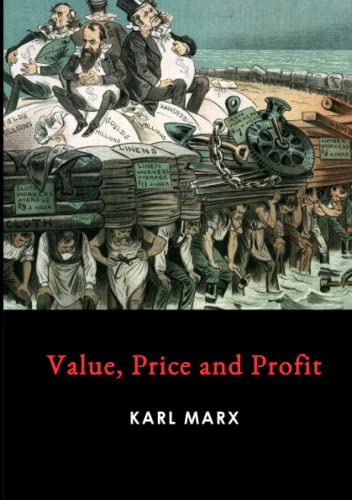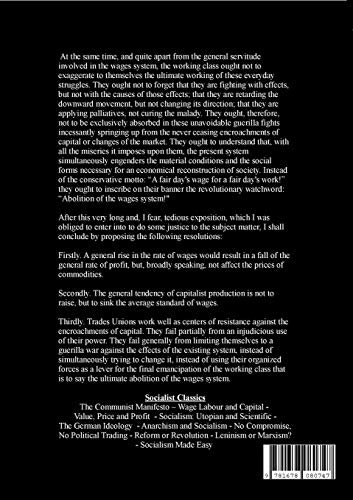


Value, Price and Profit
D**N
Advice - you need to hold on to precious books.
I study Marxism, read “value” a while back. Needed to refresh my knowledge. Price was cheaper than my original.
C**Z
A sad set of mistakes
It's a sad set of mistakes, Rothbard makes a brilliant summary of the Mises’s debunk of Marx ideas in his book The Essential MisesBy the latter half of the nineteenth century, it was clear that “classical economics,” which had reached its apogee in England in the persons of David Ricardo and John Stuart Mill, had foundered badly on the shoals of several fundamental flaws. The critical flaw was that classical economics had attempted to analyze the economy in terms of “classes” rather than the actions of individuals. As a result, the classical economists could not find the correct explanation of the underlying forces determining the values and relative prices of goods and services; nor could they analyze the actions of consumers, the crucial determinants of the activities of producers in the economy. Looking at “classes” of goods, for example, the classical economists could never resolve the “paradox of value”: the fact that bread, while extremely useful and the “staff of life,” had a low value on the market; whereas diamonds, a luxury and hence a mere frippery in terms of human survival, had a very high value on the market. If bread is clearly more useful than diamonds, then why is bread rated so much more cheaply on the market? Despairing at explaining this paradox, the classical economists unfortunately decided that values were fundamentally split: that bread, though higher in “use value” than diamonds, was for some reason lower in “exchange value.” It was out of this split that later generations of writers denounced the market economy as tragically misdirecting resources into “production for profit” as opposed to the far more beneficial “production for use.” Failing to analyze the actions of consumers, classical economists earlier than the Austrians, could not arrive at a satisfactory explanation of what it was that determined prices on the market. Groping for a solution, they unfortunately concluded (a) that value was something inherent in commodities; (b) that value must have been conferred on these goods by the processes of production; and (c) that the ultimate source of value was production “cost” or even the quantity of labor hours incurred in such production. It was this Ricardian analysis that later gave rise to Karl Marx’s perfectly logical conclusion that since all value was the product of the quantity of labor hours, then all interest and profit obtained by capitalists and employers must be “surplus value” unjustly extracted from the true earnings of the working class. Having thus given hostage to Marxism, the later Ricardians attempted to reply that capital equipment was productive and therefore reasonably earned its share in profits; but the Marxians could with justice offer the rebuttal that capital too was “embodied” or “frozen” labor, and that therefore wages should have absorbed the entire proceeds from production.The classical economists did not have a satisfactory explanation or justification for profit. Again treating the share of proceeds from production purely in terms of “classes,” the Ricardians could only see a continuing “class struggle” between “wages,” “profits,” and “rents,” with workers, capitalists, and landlords eternally warring over their respective shares. Thinking only in terms of aggregates, the Ricardians tragically separated the questions of “production” and “distribution,” with distribution a matter of conflict between these combating classes. They were forced to conclude that if wages went up, it could only be at the expense of lower profits and rents, or vice versa. Again, the Ricardians gave hostages to the Marxian system. Looking at classes rather than individuals, then, the classical economists not only had to abandon any analysis of consumption and were misled in explaining value and price; they could not even approach an explanation of the pricing of individual factors of production: of specific units of labor, land, or capital goods. As the nineteenth century passed its mid-mark, the defects and fallacies of Ricardian economics became even more glaring. Economics itself had come to a dead end.
TrustPilot
1 个月前
2 周前